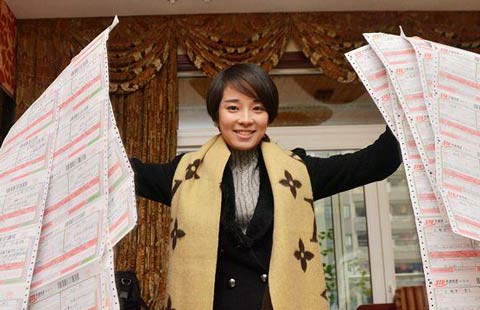Ningxia plans $1.5b overseas issue of bonds
By Zheng Yangpeng in Beijing and Wang Huazhong in Yinchuan (China Daily) Updated: 2014-12-27 09:36The northwestern Ningxia Hui autonomous region plans to sell up to $1.5 billion worth of debt in China's first local government overseas bond issuance.
According to a filing by AVIC Capital Co with the Shanghai Stock Exchange on Thursday, the company's brokerage unit has been appointed coordinator and financial adviser for the issuance.
It said Ningxia may sell the debt as a sukuk, or dollar-denominated Islamic financial certificate - similar to a bond in Western finance that complies with sharia, Islamic religious law - with maturity of up to five years, although it added that the details are still subject to change
An official with Ningxia's finance authority told China Daily that the proposed sale is still under discussion and is yet to be given approval from upper authorities.
If the proposed sale does materialize, analysts said it would mark the latest step in China's efforts to increase the transparency of how provinces and cities fund local public projects. Legal amendments were passed in August lifting a ban on direct bond sales by local governments.
Ningxia is one of the 10 regional governments that were approved by the Finance Ministry in May to issue and repay their own municipal bonds as a trial, at home or abroad. The region sold 5.5 billion yuan ($916.67 million) worth of onshore bonds in August.
"It is a good development as it allows the government to diversify its fundraising channel, and funds from offshore markets are generally cheaper," said Ivan Chung, senior vice-president at Moody's Investors Service, adding he was not aware of whether the region had invited Moody's for a credit rating. Other major international raters could not be reached for comment.
Home to the Hui ethnic group, which is Muslim, Ningxia boosts close trade and financial ties with the Muslim world, and Chung said the sukuk issue may increase the bond's appeal to cash-rich Middle East investors.
Sukuk securities are structured to comply with Islamic law and its investment principles, which prohibits the charging, or paying of interest. Instead, other tangible returns are possible, such as rent paid to the bondholder through partial ownership of a property being built into the investment, which is allowed.
Ningxia government could skip the need for a credit rating by Moody's and Standard & Poor's, as long as few overseas investors agree to buy the securities in private, said Gao Qunshan, chief analyst at fixed-income department of Industrial Securities Co Ltd.
Moody's and S&P have more rigorous rating standards than domestic agencies, he said, but the significance is limited "because the bonds being issued are special, and the amount of money raised is small".
But Chung said it is not doom that the bonds would get a low rate internationally, because provincial governments get backing from central government, and usually less developed regions have a lower debt ratio.
Some other local government financing vehicles have sold bonds overseas. Beijing Infrastructure Investment Co Ltd, a financing vehicle under the Beijing government, for instance, raised $1 billion selling 3.25 percent notes due 2020 and 2.625 percent 2017 notes on Nov 13.
Contact the writers at zhengyangpeng@chinadaily.com.cn and wanghuazhong@chinadaily.com.cn
- On Xmas, US diners take a bite of ersatz Chinese
- Three new FTZs get nod
- Fuel prices to be cut on Saturday
- Wanda takes over e-payment company 99Bill
- Home prices to decline, purchase limits to end
- Holiday travelers poised to cash in on strong yuan
- China cuts retail oil price
- Date set for pivate operators to enter broadband market
















